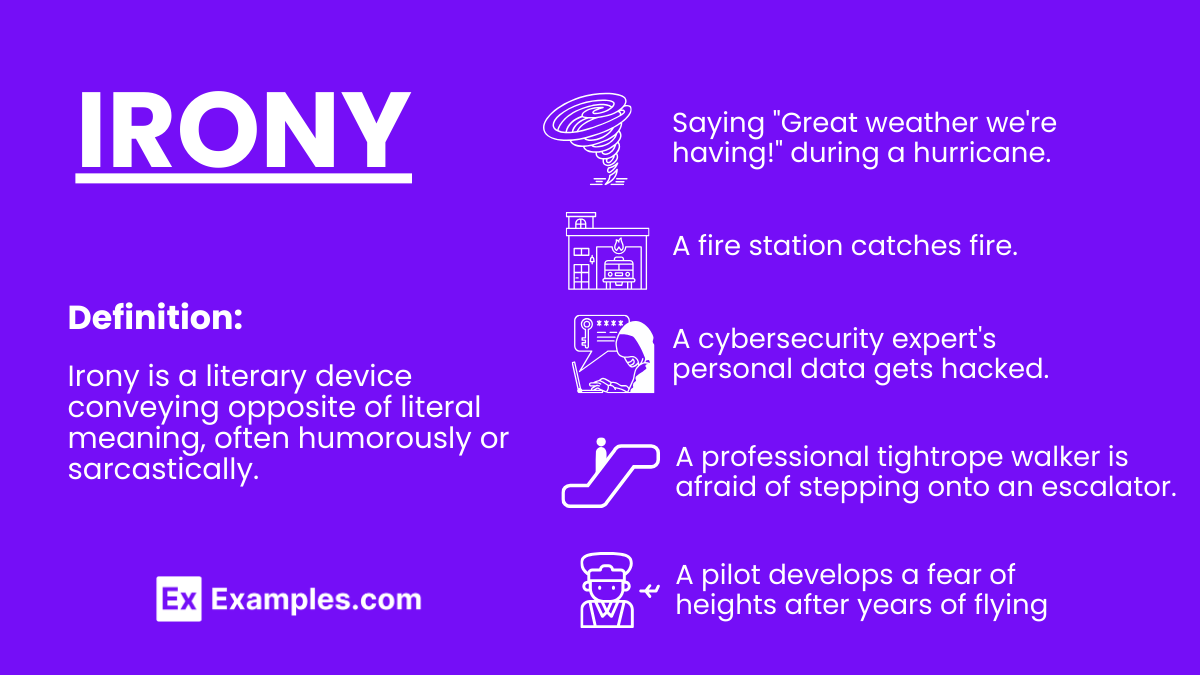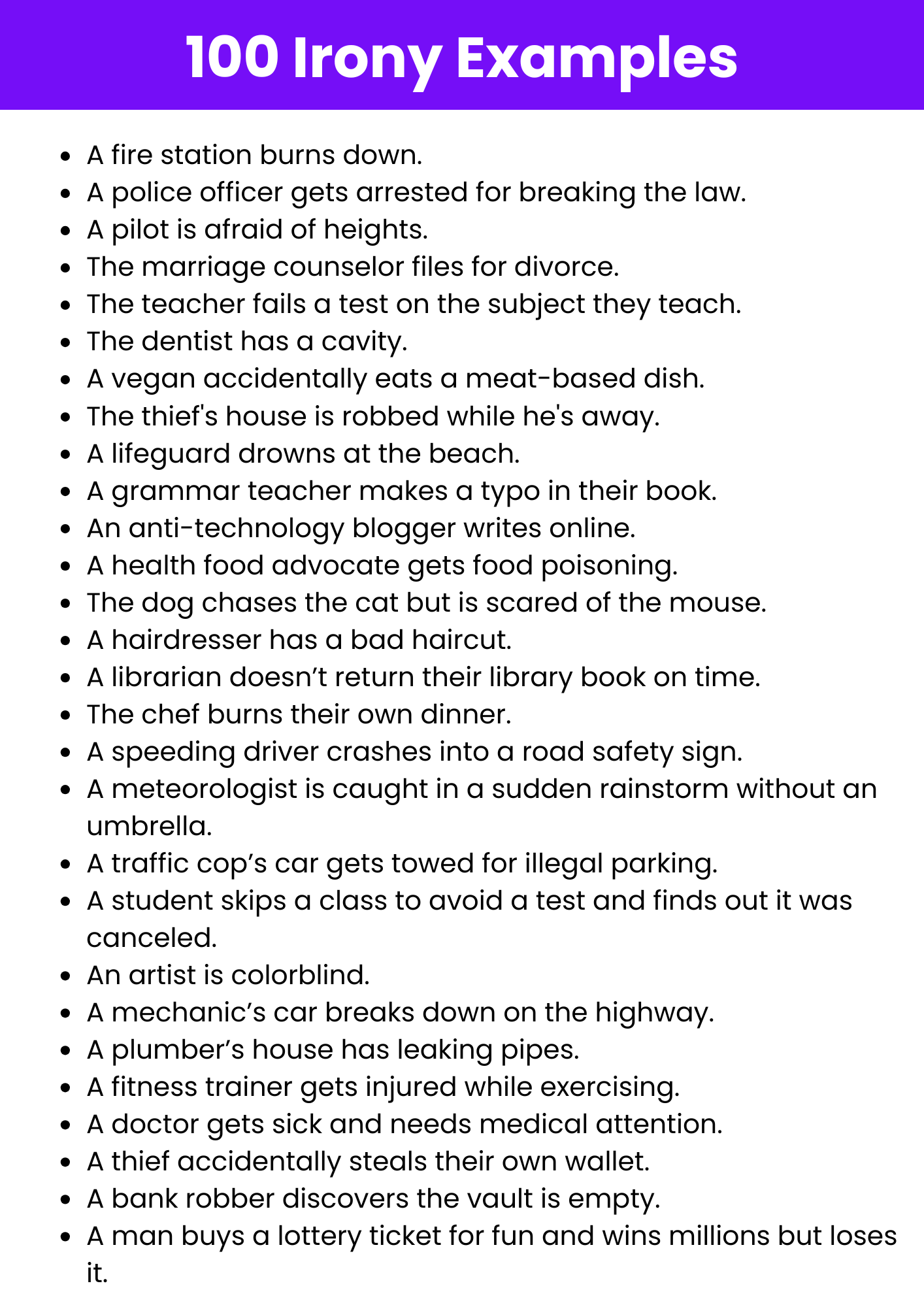Irony
What is Irony? – Definition
Irony is a rhetorical device or figure of speech where there is a discrepancy between expectations and reality. It often involves saying the opposite of what one means, creating a contrast that highlights a particular point or adds humor.

Generated Irony Examples

Examples of Irony
- A fire station burns down.
- The traffic cop gets a ticket.
- Posting about being humble on social media.
- A plumber’s house has leaky pipes.
- An antivirus software containing viruses.
- A pilot with a fear of heights.
- A teacher who never grades papers.
- A bicycle shop going out of business.
- A millionaire living in poverty.
- A comedian who never laughs.
- A police station getting robbed.
- A fitness trainer being out of shape.
- A lifeguard drowning.
- A chef who can’t cook.
- An alcoholic in a sobriety group.
- A workaholic taking a day off.
- A network engineer with no internet.
- A security guard being robbed.
- A lifeguard who can’t swim.
- A locksmith who can’t unlock doors.
- A baker who can’t bake.
- A dentist with bad teeth.
- A librarian who can’t read.
- A baker who only makes bread.
- An environmentalist polluting the ocean.
- A lifeguard afraid of water.
- A firetruck catches fire.
- A dentist with crooked teeth.
- A librarian who hates reading.
- A bird afraid of heights.
Types of Irony
Situational Irony
When the actual outcome is the opposite of what is expected.
- A fire station burns down.
- A police officer gets arrested.
- Posting about being humble on social media.
- A plumber’s house has leaky pipes.
- An antivirus software containing viruses.
Verbal Irony
When someone says the opposite of what they mean, often sarcastically.
- “What great weather!” during a thunderstorm.
- “Oh, fantastic, another meeting!”
- “I just love traffic jams!”
- “Thanks for nothing!”
- “You’re so helpful,” to someone who isn’t.
Dramatic Irony
When the audience knows something the characters do not.
- The audience knows the killer is hiding in the closet, but the character doesn’t.
- Juliet is alive, but Romeo thinks she’s dead.
- A character eats food the audience knows is poisoned.
- A hero trusts someone the audience knows is a traitor.
- The audience knows the ship is sinking, but the passengers don’t.
Cosmic Irony
When fate or a higher power works against human expectations.
- A man survives a plane crash but is struck by lightning.
- A soldier returns from war safely but dies in a car accident.
- A doctor falls ill from the disease they specialize in curing.
- A lottery winner loses their ticket.
- A man builds a flood-proof house, but it burns down.
Historical Irony
When historical events have outcomes that contradict initial expectations.
- The Titanic was called unsinkable but sank on its maiden voyage.
- Napoleon underestimated the Russian winter and lost his army.
- The Berlin Wall symbolized division but became a symbol of unity.
- The Great Wall of China was breached by bribing guards.
- Penicillin, which saved millions, was discovered accidentally.
Socratic Irony
Pretending to be ignorant to expose another’s ignorance or flaws.
- A teacher pretends not to know the answer to a simple question.
- A detective acts naive to gather more evidence.
- A lawyer asks seemingly innocent questions to catch a witness in a lie.
- A mentor pretends to misunderstand to encourage a student to think critically.
- A form of dramatic irony found in tragedies where the audience knows the tragic fate of a character.
Tragic Irony
A form of dramatic irony found in tragedies where the audience knows the tragic fate of a character.
- A hero saves a town but dies because of the rescue.
- A character rushes to avoid danger but runs into it.
- A soldier dies the day peace is declared.
- A doctor tries to save a patient but unknowingly worsens their condition.
- A beautiful garden overrun with weeds.
How to Identify/Find Irony?
To identify irony, look for situations where there is a stark contrast between expectations and reality. It often involves an outcome that is opposite to what was anticipated, creating a sense of surprise or highlighting a particular point.
- Identify instances where the outcome is opposite of what is expected.
- Look for statements that convey the opposite of their literal meaning.
- Check if the situation or statement creates a contrast that emphasizes a particular idea.
- Notice if the contrast adds depth or humor to the narrative.
- Look for subtle or hidden contrasts that reveal underlying themes.
How to Use Irony?
Use irony to add complexity and depth to your writing by highlighting contradictions or unexpected outcomes. Ensure that the ironic elements are clear to the reader and serve to reinforce the themes or messages you intend to convey.
- Incorporate irony to emphasize contrasts and highlight key points.
- Use subtlety to let the irony unfold naturally within the context.
- Integrate irony seamlessly to enhance the narrative without overwhelming the reader.
- Ensure the ironic elements support the overall theme or message.
- Avoid overusing irony to maintain its effectiveness and prevent confusion.
Other Irony Examples
Ironies in Daily Life
Daily life is filled with ironies that help us convey our thoughts, feelings, and experiences more vividly.
- A fire station burns down.
- The traffic cop gets a ticket.
- Posting about being humble on social media.
- A plumber’s house has leaky pipes.
- An antivirus software containing viruses.
Irony Examples for Kids
Introduce children to the intriguing world of irony with relatable and simple examples that illustrate unexpected outcomes.
- A teacher who never does homework.
- A library with no books.
- A playground with no swings.
- A playground that’s always closed.
- A bicycle shop out of bicycles.
Irony Examples for Students
Empower students with irony examples that make learning engaging and highlight unexpected twists in everyday scenarios.
- A student who excels in sports but struggles academically.
- A history teacher who never studies history.
- A math tutor who hates numbers.
- A librarian who never reads books.
- A science teacher who dislikes experiments.
Dead Irony Examples
Ironies that have become commonplace and may no longer have the original impact.
- A traffic jam on the way to the traffic school.
- An English teacher who writes grammatically incorrect sentences.
- A lifeguard drowning in the pool.
- A dentist with numerous cavities.
- A baker who burns every meal.
Mixed Irony Examples
Combining two or more types of irony, often resulting in a complex or humorous effect.
- A police officer speeding to catch a speeding driver.
- A professional swimmer who drowns in a bathtub.
- A firefighter’s house catching fire.
- A doctor falling ill right after declaring health benefits.
- A teacher who forgets their lesson plan.
Absolute Irony Examples
Ironies that create a strong, clear, and direct contrast between expectations and reality without any ambiguity.
- A lifeguard who can’t swim.
- A professional who is unskilled in their field.
- A police station being the site of a major crime.
- A dentist with numerous cavities.
- A baker who burns every meal.
Visual Irony Examples
Ironies that create visual contrasts or unexpected imagery to highlight the disparity between expectation and reality.
- A sunny day overshadowed by dark storm clouds.
- A fancy restaurant serving instant noodles.
- A high-tech gadget that frequently malfunctions.
- A sports car stuck in traffic.
- A beautiful garden overrun with weeds.
Explore Other Literary Devices
Elevate Your AP English Preparation
Unlock your potential with our comprehensive AP English exam preparation tools designed to help you excel.
- Extensive Question Bank: Access 900+ exam-like questions for both AP English Language and Literature.
- Expertly Crafted: Questions mirror the structure and difficulty of actual AP exams, ensuring relevant practice.
- Detailed Explanations: Understand your mistakes with clear, concise breakdowns of correct and incorrect answers.
- Personalized Learning: Tailor your study sessions with topic-specific tests and adaptive learning tools.
- Comprehensive Coverage: Master all aspects of the AP English curriculum with extensive guides and resources.
Frequently Asked Questions
-
What is irony?
Irony is a rhetorical device or figure of speech where there is a discrepancy between expectations and reality. It often involves saying the opposite of what one means, creating a contrast that highlights a particular point or adds humor. -
How does irony differ from sarcasm?
While both involve a contrast between expectation and reality, sarcasm is typically a form of verbal irony intended to mock or convey contempt. Irony, on the other hand, can be more subtle and is not always intended to hurt or mock. -
Why is irony important in literature?
Irony enriches literature by adding layers of meaning, creating suspense, and engaging readers by highlighting contradictions or unexpected outcomes. It can also enhance themes and character development. -
Can irony be used in everyday conversation?
Yes, irony is commonly used in everyday conversation to express humor, highlight contradictions, or emphasize points in a more engaging way. -
How can I effectively incorporate irony into my writing?
To incorporate irony effectively, identify the contrast between expectations and reality, ensure the ironic elements are clear to the reader, and use them to reinforce your themes or messages without overusing them.

